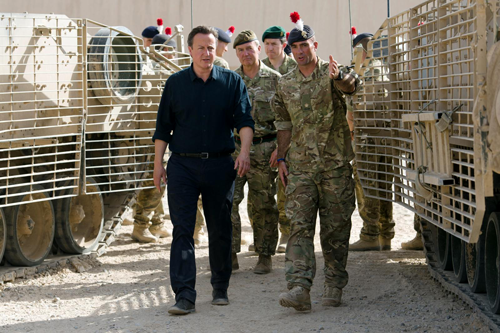
Among Prime Minister David Cameron’s most crass utterances must be his December declaration that the British campaign in Afghanistan was ‘mission accomplished’ – the same ill-fated phrase used by President Bush after the invasion of Iraq! Even the most deluded apologist for imperialism would concede that the Taliban are poised to re-take large parts of the country; that Al Qaeda (never a significant presence in Afghanistan) is now expanding exponentially in parts of the Middle East and Africa and that Afghanistan is governed by a non-democratic bunch of gangsters. Labour Defence Secretary John Reid launched Britain’s present phase of the invasion, hoping ‘not a shot would be fired in anger’. Some 26 million rounds of ammunition later 447 British service personnel have been killed, together with over 3,000 from other occupying forces and tens of thousands of the Afghan people. Almost three-quarters of the Afghan people have no access to safe water, half of them do not have enough to eat and, of those children that survive to the age of five, 60% suffer from malnourishment. Meanwhile, according to one estimate, 90% of development aid is siphoned off by the rich elite, putting Afghanistan equal top of Transparency International’s league of corruption. As for Britain’s campaign to eradicate opium production, poppy harvests have reached record levels.
Occupation to continue?
The imperialists are even having difficulty persuading their puppet to accept a post-withdrawal occupation. On 31 December, the deadline passed for a bilateral security agreement (BSA). Afghanistan is central to US strategic interests in the region, being close to the major oil regions of the Gulf and Caspian Sea and bordering Iran, Pakistan, China and several Central Asian states. A military presence here would form an important link in Obama’s ‘Asian axis’ aimed at blocking the spread of Chinese influence. Though occupying combat forces are due to withdraw from Afghanistan by the end of this year, the US wants to retain several permanent military bases and around 8,000 troops with more from Britain and other NATO countries. They would continue to arm, train and assist the Afghan military and would, no doubt, include CIA and other special forces carrying out covert operations – in other words business as usual.
One sticking point in talks had been US insistence that Afghan authorities would waive jurisdiction over US military personnel and civilians. Iraq’s refusal to accept a similar demand led to the withdrawal of US forces there. Another problem, Afghan President Karzai’s insistence that foreign forces should stop raiding Afghan homes, seemed to have been circumvented by an ‘acknowledgement that continued US military operations to defeat Al Qaeda and its affiliates may be appropriate’ and that US-led raids on Afghan homes would be allowed under ‘extraordinary circumstances’ to save the lives of US soldiers, which could, of course, be interpreted as permitting anything. In any case, under the terms of the agreement, the US would continue to be the guarantor of Afghanistan’s sovereignty: a similar ‘catch-all’ provision.
In November, US Secretary of State John Kerry announced that an agreement had been reached but President Karzai would not sign the BSA without the backing of the Loya Jirga, a meeting of around 2,500 tribal leaders, warlords, and officials from around the country. After the US had reportedly handed out sufficient bribes, the Loya Jirga duly gave its approval, but Karzai still refused to sign. He first wanted peace talks to begin with the Taliban and the release of 17 Afghan prisoners in Guantanamo. He also wanted to delay signing until after the April elections, no doubt in the hope of giving his chosen successor an advantage.
The US has several options to ensure it gets what it wants. One would be to stop the funding that maintains the Afghan security forces and the ‘development’ aid from which the corrupt Afghan elite derive much of their wealth. Another would be to ensure a more amenable candidate wins the elections – not difficult in a country where 20.7 million voting cards have been issued for an estimated 13.5 million eligible voters. Karzai would also do well to bear in mind that the US is not averse to ‘eliminating’ former stooges who get in its way.
Jim Craven




